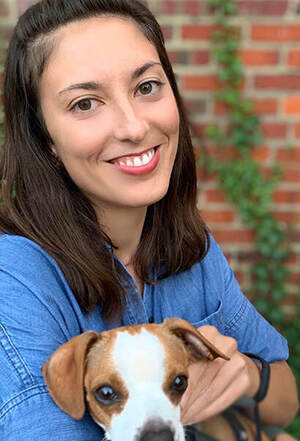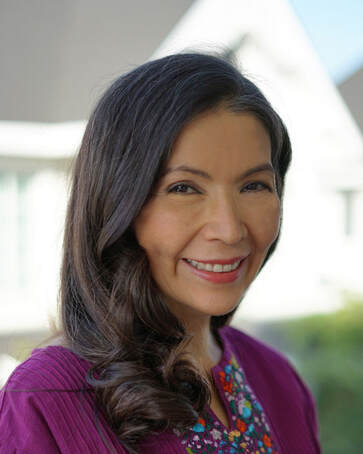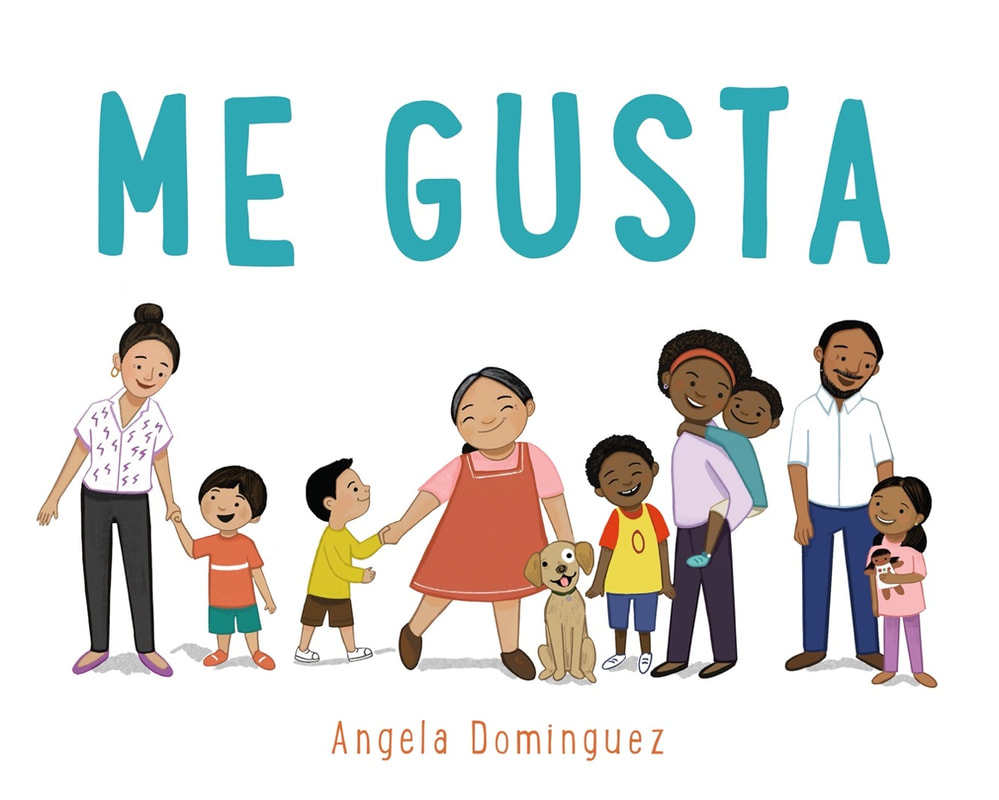|
Today, we are celebrating Angela Dominguez’ latest picture book, ME GUSTA (Henry Hold and Company), a story that celebrates multicultural and multiethnic communities. ME GUSTA is a book about affirmation and love. Scroll on to read her conversation with Musa Judith Valdés B! JUDITH VALDÉS B: Angela, I had the privilege of reading your story, ME GUSTA, and was captivated by your voice. What inspired you to write this story? ANGELA DOMINGUEZ: I’ve had this idea floating in my head for a few years. I kept imagining a child listing things they liked and finding a common ground with a friend, but it wasn’t enough of a concept to create a whole book. Then in 2020, one of my long-term editors, Kate, and I were brainstorming what my next book could be. We were discussing all the recent upsetting news and how it would be great to create a new book with an uplifting message. Suddenly it clicked, and I knew what the story for ME GUSTA would be. A story that celebrates the love of family, culture, and overcoming adversity. However instead of a child as the narrator, it would be a parental figure. JUDITH: With ME GUSTA, you certainly created a book with an uplifting message in a simple, calm, yet powerful voice. Did you ever think that ME GUSTA would become an invitation for children of all backgrounds and ethnicities to speak up about the things they like and do not like? ANGELA: What a wonderful question. I always hope that my books are universally appealing and that all children can relate to the themes and concepts. Nothing would make me happier than the thought that this book could encourage all children to speak with their own thoughts and feelings. JUDITH: The images are beautiful. How did you decide on the style of illustration that you did? ANGELA: When it came to the illustrations, I wanted to use bright colors and showcase a diverse range of Latino families. It’s impossible to encapsulate all Latinos into one book, but I tried to be as specific and as varied as possible. JUDITH: The settings in the story include the countryside, a small city, a big city, and the desert. Did you get your inspiration for those settings from places where you have lived? ANGELA: Definitely! I grew up in Texas and have lived in San Francisco, New York, and a few other places. They’ve inspired many of the settings. In addition, my mother lived in El Paso for a few years for work and I fell in love with the desert landscape. JUDITH: ME GUSTA includes some words in Spanish spread perfectly throughout the story, not too many, nor too few. Did you always intend for ME GUSTA to be a bilingual book? ANGELA: I’ve been working with Kate since she discovered my dummy for MARIA HAD A LITTLE LLAMA/MARIA TENÍA UNA LLAMITA in a slush pile. We’ve worked on a variety of books since then including I’M HUNGRY/TENGO HAMBRE and HOW ARE YOU? ¿CÓMO ESTÁS? The majority of my books with her have been bilingual and it’s been amazing to have her be supportive of that. They are the type of books that I would have loved to have seen as a kid. Books that feature Spanish but are also accessible, and not overwhelming if your reading comprehension isn’t the best in Spanish. At the same time, feature friendly familiar words for those who are learning English as well. JUDITH: I find it wonderful that your books include not only words in Spanish but that they also draw on cultural aspects of different groups of Latinos. Could you tell us a bit about your bicultural upbringing? ANGELA: I grew up understanding Spanish, but mostly responding back in English or with some Spanish sprinkled in. I’ve worked on my Spanish as an adult, but I have to admit I can be a little shy about it among people outside of my family. It’s a big reason I love encouraging kids to speak their native language. It’s way harder as an adult! JUDITH: Something that I love about your book is how you draw the reader to the story by introducing the things you like (who doesn’t like ice cream/helado?), in a way underscoring for the reader, “See, I am just like you!” This also prepares the readers' hearts for what you don’t like. The things that “no te gustan” are powerful, representing the challenges we face as immigrants. What sentiment or conclusion do you hope the reader takes away from ME GUSTA? ANGELA: Simply, I would hope children realize that we have a lot in common no matter what their cultural ethnicity. We all have people that care for us, and we all want to feel accepted. It’s been disheartening to see a rise in racism or xenophobia. It’s easy to feel hopeless. The more we can understand and accept each other the stronger our communities will become. JUDITH: I agree. Children are the future, and planting seeds of understanding and acceptance is an important investment that we must make in them. Angela, Throughout the story, you represented the profound relationships that exist between children and their parents/families. You wrote about how home is wherever they were gathered and united. It would be hard to convey so clearly this emotion, this aspect of the story, without having experienced it yourself. Could you share with us what inspired you to include this? ANGELA: For me, home is not a place. It’s a feeling that you experience when you are with people who love you. Being an immigrant as well, we didn’t have one singular childhood home. We have also moved around a few times since I finished high school. I feel that sense of belonging or sense of home whenever I hear my nickname “Teté” or receive a hug from a loved one. JUDITH: Lastly, could you please tell us a little about you, about the things that te gustan? For example, which flavor of ice cream is tu favorito? ANGELA: My absolute favorite is lime sherbet from Braum’s. I don’t have it too often, but it makes me so happy when I have it. JUDITH: When was the last time you ran through the sprinklers? ANGELA: I believe it was in college. We were loopy from working on projects all night. It was so much fun! JUDITH: Do you have a pet dog? ANGELA: I do! Her name is Petunia. She is a Boston Terrier/Chihuahua mix and simply adorable. We adore her. JUDITH: Which filling/relleno in an empanada is tu favorito? ANGELA: Definitely, picadillo. JUDITH: Cuál is your favorite family tradition? ANGELA: My favorite traditions are on New Year's Eve. There is always so much excitement for the new year and a fresh start. No matter where I am, I must have my uvas, maleta, and a broom to sweep the front door. JUDITH: Angela, thank you much for your time. I enjoyed this conversation almost as much as I enjoyed ME GUSTA! Buy ME GUSTA today!  Angela Dominguez was born in Mexico City and raised in Texas. She now resides on the east coast with her boyfriend, Kyle, and their petite dog, Petunia. She is also the author and illustrator of several books for children and a two-time Pura Belpré Illustration Honoree. Her debut middle grade novel, Stella Díaz Has Something To Say, was a New York Public Library and a Chicago Public Library pick for Best Books for Kids, Sid Fleischman Award winner, and an ALA Notable. She recently illustrated Supreme Court Justice Sonia Sotomayor’s newest picture book, Just Help! How to Build a Better World. When Angela is not in her studio or visiting schools, she teaches at the Academy of Art University, which honored her with their Distinguished Alumni Award in 2013. Angela is a proud member of SCBWI, PEN America, and represented by Wernick and Pratt Literary Agency. As a child, she loved reading books and making a mess creating pictures. She’s delighted to still be doing both.  Judith Valdés B. is an author and illustrator of children’s picture books. Growing up in Mexico, she loved listening to her father tell stories, which were wonderfully simple and short on words yet full of meaning. Often sketching as he spoke, Judith dreamed of retelling his tales one day. Judith calls San Diego home, but she also lived in Annapolis, Hermosillo, London, Brussels, and Bangkok. She volunteers with charity organizations focused on meeting the needs of children. Of indigenous Mexican descent, Judith celebrates multiculturalism through her writings and illustrations. She is married and has three third culture kids, who inspire her. When she is not in her studio, Judith can be found cooking, stargazing, or looking for books at the library.
0 Comments
Leave a Reply. |
Las Musas SpeakWelcome to our blog! Archives
July 2024
Categories
All
|


 RSS Feed
RSS Feed